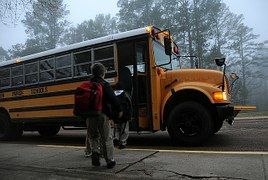
Recently, I have been involved in conversations with parents about plans to change school start times in two school districts, one in Minnesota and one in Delaware. In both districts, moving high school start times later is being considered, with elementary schools being proposed to start earlier.
The grass roots movement to start school later has been primarily concerned with later starts for middle and high schools predicated on the robust research finding that post pubertal adolescents have a very difficult time going to sleep until later in the evening due to shifted timing of melatonin release. Thus it is thought that allowing them to sleep a little longer on school mornings will give the opportunity (but not guarantee) that they will get more sleep. When school boards and parents have accepted this rationale, one frequent solution is to flip the bus schedules and have elementary schools start earlier than high schools. Having to run two bus schedules is driven by practical/financial considerations.
In both the Minnesota and Delaware districts, some parents of elementary students are objecting to an earlier start and they have cited our 2015 study in the Journal of Educational Psychology as indicating elementary school students may not do as well with earlier start times (Keller et al. 2015). Until we did our study in Kentucky, no one had considered very much that starting school earlier for elementary children would be problematic. We were actually surprised that we found correlations showing that school districts with earlier starts for elementary students had lower standardized test scores. But correlation does not mean causation. There are many strengths of the study we did but also many limitations in terms of conclusions. The finding needs to be replicated several times in other states before I would even have a lot of confidence in generalizing the correlation, and still no causal effect could be concluded.
To complicate matters more, in the Delaware case, some of the schools in low-income neighborhoods start early and have after school tutoring programs for students that have been very successful. Administrators say that such programs would not be possible if schools started later.
All that said, my own opinion is that I would like to see no schools begin earlier than 8:30 AM. That is the stance of the American Academy of Pediatrics concerning middle and high schools.
I would go further and include elementary schools. The issue is really not so much about start times per se as it is about trying to find ways for children to attain more sleep. Schools could start at noon and some children would still not get enough sleep. But schools should do what they can to afford the opportunity for children to arrive at school having slept sufficiently long and well. This includes later start times and limiting drastically all of the evening school-sponsored activities that preclude the possibility of earlier bedtimes.
Keller, P. S., Smith, O. A., Gilbert, L. R., Bi, S., Haak, E. A., & Buckhalt, J. A. (2015). Earlier school start times as a risk factor for poor school performance: An examination of public elementary schools in the commonwealth of Kentucky. Journal of Educational Psychology, 107(1), 236-245.


